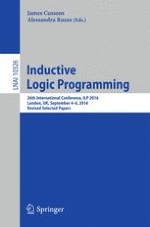This book constitutes the thoroughly refereed post-conference proceedings of the 26th International Conference on Inductive Logic Programming, ILP 2016, held in London, UK, in September 2016.
The 10 full papers presented were carefully reviewed and selected from 29 submissions. The papers represent well the current breath of ILP research topics such as predicate invention; graph-based learning; spatial learning; logical foundations; statistical relational learning; probabilistic ILP; implementation and scalability; applications in robotics, cyber security and games.
